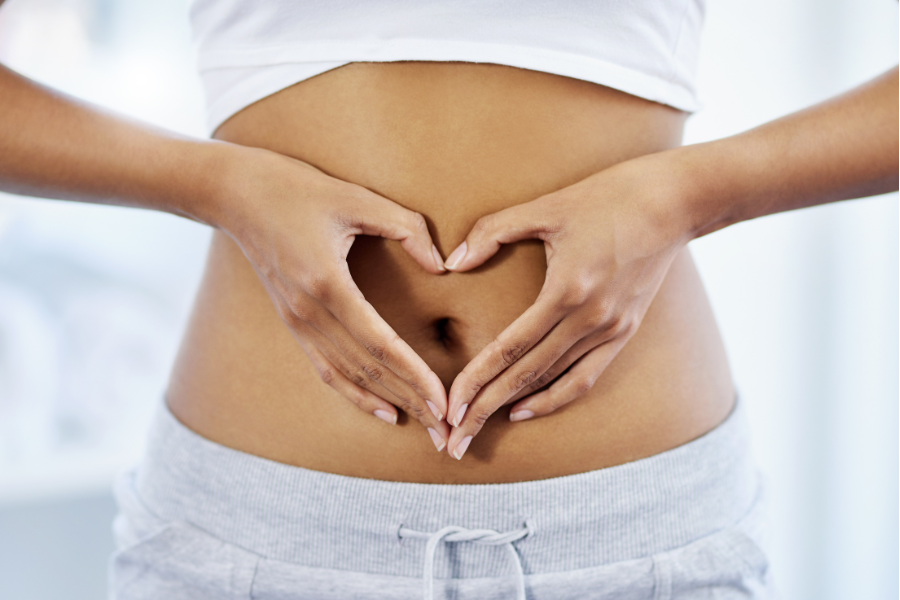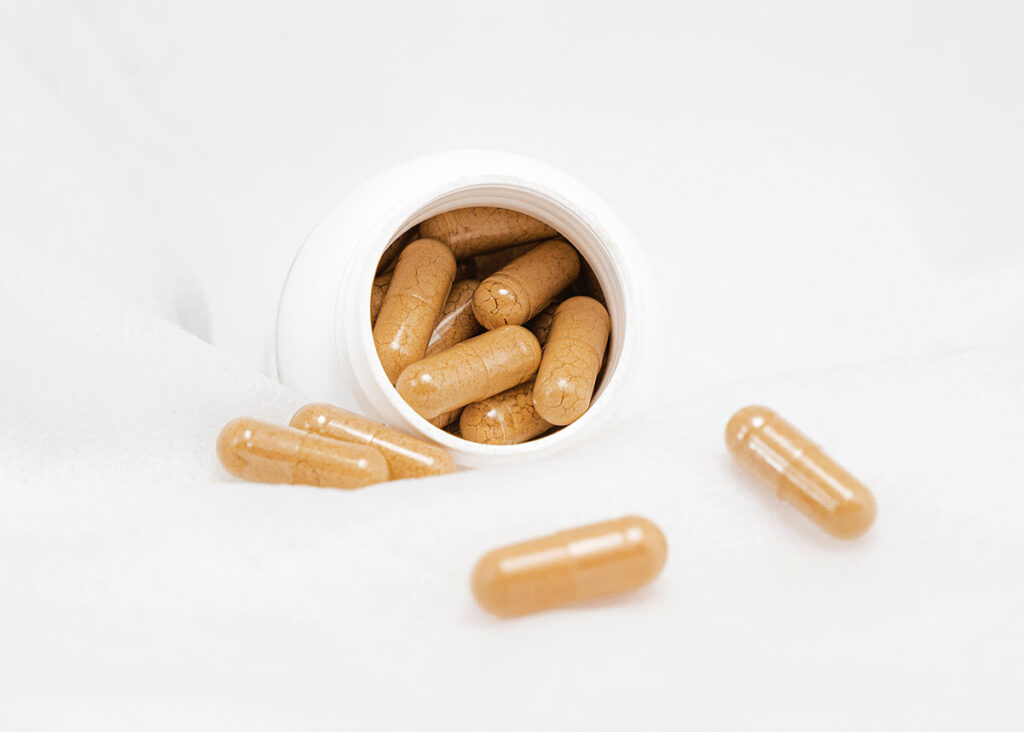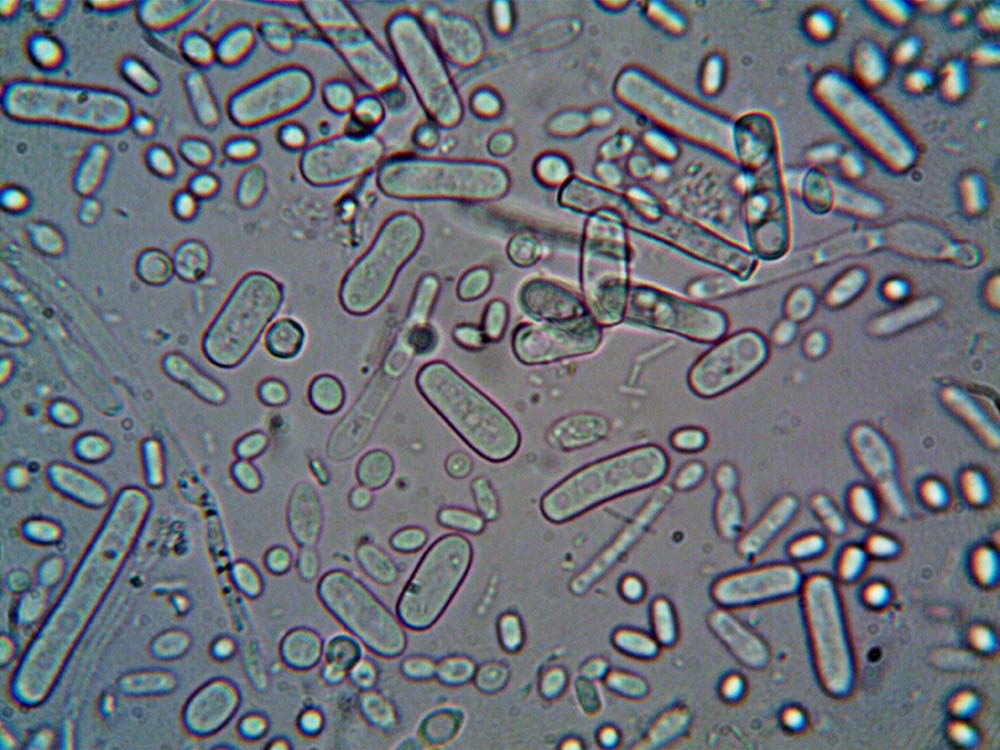
Probiotics for Anxiety—Unleashing Inner Calm
Contents
This article may contain compensated links. Please read Disclaimer for more info. As an Amazon Associate, I earn from qualifying purchases.
Your nerves are going haywire, like a squirrel on a caffeine binge.
Finding peace in a frantic world is just too hard.
You’re tired of anxiety calling the shots in this constant battle of the mind.
Naturally, you know all the ins and outs about dealing with distress: therapy for anxiety, psychotropic medication, mindfulness, guided meditation, mindful breathing…
But in the end, it’s like chasing a rainbow—terribly exhausting and then starting again at square one.
Ready for a quirky solution that might be the final piece of the puzzle?
Let’s address body and mind simultaneously and give probiotics for anxiety a try.
Probiotics…anxiety? Yes, that’s right.
While their association with digestive health is well-known, recent research has shed light on the benefits of probiotics for mental health: Happy mind, happy life might actually start with a happy gut.
Brace yourselves for a wild ride as we uncover the mysteries and science underlying the best probiotic for anxiety. You’ll be dazzled by their remarkable potential to bring peace to your troubled mind.
Overview of the Best Probiotics for Anxiety Relief
Let’s get right to the best probiotics and their astounding ability to reduce anxiety. Specific strains have gained quite a reputation for their ability to tackle anxiety-related issues.
I. What Are Probiotics?
Defining Probiotics and Their Benefits
Wondering what probiotics do and why they’re all the rage?
Simply put, probiotics are beneficial bacteria that promote a healthy balance in your gut flora. But their effects extend far beyond the digestive system.
So, what do probiotics help with?
They can bolster your overall health and even improve your mental well-being.
When it comes to finding the best probiotic, it’s essential to consider your specific needs. Whether you opt for probiotic capsules or prefer natural probiotics found in fermented foods, there are options to suit you out there.
And let’s not forget that probiotics for men and probiotics for women can address gender-specific health concerns.
Whether you choose probiotic medicine or incorporate probiotic-rich foods into your diet, harnessing the power of these friendly bacteria can contribute to your overall well-being.
How Probiotics Work in the Body
Curious about what happens when you take probiotics every day?
At the core of it all lies the gut microbiota, a bustling community of microorganisms residing in your digestive system.
Once you introduce probiotics, they join this lively ensemble, bolstering diversity and balance for your bowel health.
One of the remarkable benefits of probiotics is their impact on the immune system. They communicate with immune cells, helping to regulate and strengthen their responses, ensuring a vigilant defense against harmful invaders.
Moreover, probiotics have been associated with reducing inflammation, a key player in various health conditions.
But the wonders don’t stop there.
Did you know that the gut and brain are intertwined? Probiotics have shown promise in modulating anxiety by influencing neurotransmitters, the messengers of the brain. They can help calm the stress response and promote a sense of serenity.
Whether you’re seeking probiotics for mood and anxiety or aiming to optimize your gut wellness, these beneficial probiotic bacteria can offer an array of benefits.

II. The Gut-Brain Connection
Exploring the Gut-Brain Axis
The gut-brain axis is the superhighway of communication between our gut and brain. It’s a two-way street where biochemical signals travel, connecting the GI tract to the central nervous system.
But not only the gut and brain are involved; you have a whole crew of microorganisms in your gut called the gut microbiota that join in on the conversation.
This axis is crucial for all sorts of body functions, from digestion, metabolism, and immune function to even behavior and cognition.
Let’s break it down into its main components:
- The vagus nerve: At the interface of the microbiota-gut-brain axis, we find the vagus nerve, acting as a route for communication. It ensures smooth interactions between these two powerhouses.
- Neurotransmitters: Both the gut and brain produce neurotransmitters, such as serotonin, dopamine, and GABA. They act as chemical messengers between nerve cells and have a profound impact on brain function and mood.
- Hormones: The gut releases hormones like ghrelin and peptide YY, regulating your appetite and telling the brain when you’re hungry or full. These hormones play a crucial role in signaling your brain to manage your food intake.
- Gut microbiota: The gut is home to trillions of microorganisms, collectively known as the gut microbiota. They produce metabolites, the neurotransmitters, vitamins, and short-chain fatty acids that influence overall brain function and health.
When the gut-brain axis is disrupted or imbalanced, it can contribute to various conditions. These include gastrointestinal disorders, mood disorders like anxiety and depression, and neurological conditions.
The Role of Gut Microbiota in Mental Health
Research suggests that imbalances in the gut microbiota, known as dysbiosis, may contribute to anxiety disorders and other mental health issues.
On a biological level, dysbiosis means increased inflammation, impaired neurotransmitter production, and altered stress responses. A healthy and diverse gut microbiota can therefore positively impact your emotional well-being.
Unlocking the secrets of the role of gut microbiota opens up a world of possibilities for improving your overall well-being. From personalized diets to targeted interventions, scientists and health professionals are keen to harness the power of the gut to enhance human health.
How Probiotics Can Reduce Anxiety Symptoms
Probiotics have the remarkable ability to produce serotonin and gamma-aminobutyric acid (GABA) that play a vital role in regulating mood and anxiety.
You can think of them as natural mood boosters and stress busters. This is why they’re often called “psychobiotics”.
Another fascinating aspect is how probiotics strengthen your gut lining, acting as a shield against harmful substances that can trigger anxiety responses. It’s like giving your gut a superhero cape.
Remember, always consult with a healthcare professional to determine the right psychobiotic regimen for your specific needs.
III. The Best Probiotic Strains for Anxiety
Lactobacillus rhamnosus: The Calming Strain
Lactobacillus rhamnosus deserves the spotlight when it comes to overcoming mental health issues.
This bad boy has been making waves for its impressive anxiety-busting abilities, earning it the title of the “Calming Strain.”
L. rhamnosus is one of the most extensively studied probiotic strains for anxiety relief. It has demonstrated the ability to reduce anxiety-like behavior and improve cognitive function in animal models.
Research further suggests that the strain can modulate the expression of stress-related genes and promote the production of neurotransmitters that boost relaxation and calmness.
Whether you’re battling those nerve-racking moments, panic attacks, or trying to keep your OCD in check, L. rhamnosus could be your new best friend.
Bifidobacterium longum: The Natural Mood Regulator
Bifidobacterium longum is another fascinating probiotic that plays a crucial role in boosting your emotional well-being.
Studies indicate that B. longum can positively influence your mental state, reduce stress responses, and improve cognitive function. It works its magic by teaming up with your gut-brain axis.
It influences the production of neurotransmitters like serotonin and GABA, acting as a natural mood regulator and helping to ease those pesky anxiety symptoms.
Lactobacillus helveticus: The Anti-Stress Hero
Lactobacillus helveticus has shown to lower cortisol levels, which is the stress hormone. This means it helps you stay calm and composed during challenging situations.
But that’s not all.
Studies have further revealed that L. helveticus can alleviate specific anxiety-related symptoms such as paranoia and obsessive-compulsive thoughts. Imagine having a natural solution to help ease those worrisome and intrusive thoughts.
And here’s something intriguing:
L. helveticus has even demonstrated its superiority to a commonly used SSRI antidepressant, Citalopram, in reducing anxiety-like behavior in animal studies. It not only lowered stress hormone levels but also increased serotonin, which is associated with positive mood.
Lactobacillus plantarum: The Psychotropic Miracle
When it comes to picking the best probiotic for anxiety, Lactobacillus plantarum is another probiotic species that works wonders.
In a study conducted on patients with irritable bowel syndrome, researchers administered L. plantarum. Not only did it improve their bowel symptoms, but it also significantly reduced their anxiety levels.
Some animal studies further proved that L. plantarum can bring about positive changes in emotional behaviors and significantly reduce anxiety-like behaviors.
So, how does it do it?
By boosting dopamine and serotonin, lowering stress hormone levels, and even taming inflammation all at the same time.
Therefore, researchers have concluded that L. plantarum possesses psychotropic properties, meaning it affects the mind positively. The big advantage: without all the nasty physical side effects that come with antidepressants.
That’s remarkable news for those looking for less intrusive ways to tackle anxiety and other neuropsychiatric disorders.
Here’s a fun fact: You can find Lactobacillus plantarum in several fermented vegetables, like kimchi, sauerkraut, pickles, and brined olives. So, while you’re enjoying these delicious foods, you’re also giving your gut and mood a little lift.
Limosilactobacillus reuteri: The Happiness Booster
Limosilactobacillus reuteri is a type of lactic acid bacteria that naturally resides in our intestines and stomach.
Interestingly, it used to be more prevalent in the population but has decreased over the years.
Research has shown that L. reuteri offers numerous benefits, including promoting gut health and combating inflammation.
But even more exciting: L. reuteri has been found to boost oxytocin levels, which makes it a promising treatment not only for anxiety but also for autism spectrum disorder and similar conditions. Oxytocin, also known as the “love hormone,” plays a crucial role in social bonding and connection.
By replenishing your gut with L. reuteri, you may experience a range of positive effects. People have reported improvements in sociability, increased energy, and better digestion.
It’s important to note that if you have symptoms of small intestinal bacterial overgrowth (SIBO), you should exercise caution when taking these probiotics. SIBO involves an overgrowth of bacteria in the small intestines, and additional bacterial supplementation could exacerbate the condition.
Lactobacillus fermentum: The Health Replenisher
Lactobacillus fermentum is also commonly found in fermented vegetables.
While it hasn’t been studied as much as other lactobacillus probiotic species, there’s some evidence suggesting it could help treat anxiety, especially if you’ve had a long history of antibiotic treatment.
Antibiotics can mess with your microbiome and through the gut-brain axis trigger anxiety.
But here’s the exciting part: researchers have found that giving animals L. fermentum can reduce inflammation and reverse the psychological problems caused by antibiotics, including anxiety-like behavior.
So, if you’ve taken lots of antibiotics over the years or noticed that your anxiety worsened after a course of antibiotics, it might be worth giving a psychobiotic supplement with L. fermentum a shot. It could potentially make a positive difference in your mental well-being.

IV. Finding the Right Probiotic Product
Understanding Probiotic Labels: CFUs, Strains, and Potency
When you’re shopping for probiotics for anxiety, there are a few key factors to keep in mind. Understanding what to look for can ensure you choose a quality product that provides maximum benefits. Let’s break it down.
- Prioritize quality. Look for probiotics that contain live and active cultures. Additionally, opt for probiotics that are third-party tested and GMO-free.
- Consider potency and CFUs. Potency is measured in colony-forming units (CFUs), which represent the number of viable bacterial cells in each dose. While CFUs can range from 1-10 billion or more, higher potency doesn’t necessarily mean better. Select a dosage that suits your specific needs.
- Look out for a variety of strains. Multiple strains offer unique benefits that single-strain probiotics can’t match. They work together to create a diverse gut microbiome, which studies have shown to be more effective. To combat anxiety, ideally pick a product that contains some of the strains mentioned above.
- Be mindful of fillers. Some probiotics may contain unnecessary fillers that could have negative effects. These fillers are added to bulk up the product or enhance its properties. While some are harmless, others may cause digestive issues or allergic reactions.
By considering these points, you’ll be well-equipped to choose a high-quality probiotic that suits your individual needs. So, get the best probiotic brand for anxiety out there. Your journey to anxiety relief deserves nothing less.
Choosing the Right Probiotic Delivery Form
Probiotics come in different delivery forms, like capsules, powders, and certain foods. So, how do you choose the right one for you?
It all depends on your personal preferences and lifestyle.
Let’s start with capsules. They’re most convenient and easy to include in your daily routine. Just pop one in, and you’re good to go. They’re great for people on the move or those who prefer a hassle-free approach.
On the other hand, powders offer some extra versatility. You can mix them into your favorite beverages or foods. Whether it’s a smoothie, a glass of water, or even your morning cereal, powders let you get creative and add probiotics to whatever tickles your taste buds.
Others, again, prefer getting their probiotics from natural food sources. Yogurt lovers, for example, can get their dose of probiotics straight from their favorite creamy snack. Fermented vegetables like sauerkraut or kimchi are also great options for those who enjoy adding a tangy twist to their meals.
Factors to Consider When Selecting a Probiotic Brand
When it comes to finding the right probiotic brand to help with anxiety, there are a few key points to consider.
- Look for reputable brands that prioritize scientific research, ensuring their probiotics are effective. You want a brand that invests in clinical studies and provides evidence of their product’s benefits for mental health.
- Checking customer reviews can provide valuable insights into the effectiveness of a brand’s probiotics for mood improvement. Look for reviews from individuals who have experienced positive changes in their mental well-being after using the product.
- Seeking recommendations from trusted sources, such as healthcare professionals or friends who have had success with probiotics for mood enhancement, can also be helpful in narrowing down your options.
These factors are essential in finding the brand that suits your needs and supports your mental well-being.
V. Potential Side Effects and Precautions
Possible Side Effects of Probiotics
It’s important to be aware of possible side effects that some people may experience when taking probiotics. In the beginning, you might encounter a few mild issues like bloating, gas, or a bit of digestive discomfort.
Don’t worry too much, though. These symptoms usually go away as your body gets used to the probiotics.
However, if you’re having some intense or long-lasting side effects, it’s always a good idea to reach out to a healthcare professional. They can provide guidance and make sure everything is alright.
Remember, the majority of people tolerate probiotics just fine and experience no problems at all. So, don’t let the potential side effects scare you away from reaping the many benefits probiotics have to offer.
Just keep an eye out for any unusual reactions and get the help you need if things don’t seem quite right.
Precautions and Contraindications
There are a few groups who should take some extra precautions or chat with a healthcare provider before diving into a probiotic treatment.
If you have a weakened immune system, a serious health condition, or you’re sick, it’s a good idea to be cautious. These situations might warrant a discussion with your doctor to make sure probiotics won’t cause any issues.
The same holds true if you’re pregnant or breastfeeding and planning to take some mood boosting probiotics. A healthcare provider can provide guidance and make sure it’s the right choice for you and your little one.
Embrace the Calming Power of Probiotics
Well done!
You’ve embarked on a wild journey through the fascinating realm of probiotics for anxiety relief.
We’ve explored the gut-brain connection, uncovered the superpowers of different probiotic strains, and even dabbled in decoding probiotic labels.
But what’s the grand finale, you ask?
It’s the realization that peace of mind might go hand in hand with a happy gut.
So, embrace those beneficial bacteria from Lactobacillus rhamnosus to Bifidobacterium longum as your allies to calm your mind.
Keep exploring the vast world of probiotics, experiment with probiotic-rich foods, and discover the best ways to support your mind-body relationship.
With patience, the right mix of treatment, and a sprinkle of probiotic magic, you’re on your way to improving tranquility and mitigating anxiety.

Frequently Asked Questions
Here are some quick answers to questions about probiotics for anxiety we often hear. Maybe your question is among them?
What is the gut-brain axis?
The gut-brain axis is a bidirectional communication system. It signifies a complex network connecting the gut, host to diverse microorganisms, and the brain, the command center of our thoughts and emotions.
Recent research has unraveled the profound impact of the gut on our mental well-being, revealing an intriguing link between the microbiome—the community of gut microorganisms—and anxiety.
While probiotics alone might not cure anxiety alone, they offer potential in a comprehensive approach to anxiety management. Ongoing research aims to further explore their therapeutic benefits.
How can I improve my gut-brain axis?
To boost your gut-brain axis, follow these simple steps to enhance your mind-body relationship:
1. Start with probiotics: Get your daily dose of probiotics from foods like yogurt, sauerkraut, or consider a quality supplement.
2. Eat well: Focus on a balanced diet filled with whole foods and fiber-rich options like legumes and seeds.
3. Manage stress: Find activities that help you unwind, like meditation, yoga, or going for walks, to keep stress in check.
4. Stay active: Get moving with exercises you enjoy to support a healthy gut-brain axis.
5. Sleep tight: Prioritize quality sleep of 7-9 hours each night.
Minimize toxins: Limit alcohol, processed foods, and exposure to environmental toxins.
Embrace these steps for a happier gut and a calmer mind.
When did the theory of the gut-brain axis become popular?
The gut-brain axis concept gained traction in the early 2000s. Scientists recognized the intricate connection between the gut and the brain, highlighting their bidirectional communication and influence.
Dr. Michael Gershon’s pioneering work in neurogastroenterology shed light on the extensive network of gut neurons and their impact on emotions and behavior.
Technological advancements like molecular biology and neuroimaging allowed deeper exploration of the gut-brain axis, uncovering the role of gut microbiota, neurotransmitters, and immune responses.
Today, the gut-brain axis is a widely studied area in neuroscience, gastroenterology, and psychology, revealing the profound link between gut health and mental well-being.
Who came up with the concept of the gut-brain axis?
The gut-brain axis has long been recognized:
Robert Whytt, a Scottish physician, coined the term “nervous sympathy” in 1765 to describe the mechanisms linking the internal organs. He discovered that the gut contained a large number of nerve endings that transmitted “nervous energy” throughout the body.
Can probiotics really help with anxiety?
While research on the effects of probiotics on anxiety is still ongoing, emerging evidence suggests that specific strains can have a positive impact on anxiety symptoms.
Probiotics have shown potential for modulating the gut-brain axis, reducing inflammation, and influencing neurotransmitter production, all of which can contribute to anxiety relief.
However, individual responses may vary, and it’s important to approach probiotics as part of a holistic approach to anxiety management.
How long does it take for probiotics to show results?
The timeline for experiencing the effects of probiotics can vary from person to person.
Some individuals may notice improvements in their anxiety symptoms within a few weeks of consistent supplementation, while others may need more time.
It’s important to be patient and maintain regular use of probiotics to allow the beneficial microorganisms to establish their effects on the body. Stay committed to your probiotic routine, and before you know it, you’ll start reaping the benefits.
Can I take probiotics with medications for anxiety?
If you are currently taking medications for anxiety, it’s important to consult your healthcare provider before starting probiotic supplementation.
While probiotics are generally safe, certain interactions may occur between probiotics and medications.
Your healthcare provider can provide guidance on potential interactions and help determine the best approach for incorporating probiotics into your anxiety management plan.
What is the significance of anxiety management with probiotics?
Anxiety comes in a huge variety of forms with numerous labels:
Generalized Anxiety Disorder, Panic Disorder, Social Anxiety Disorder, Specific Phobias, Obsessive-Compulsive Disorder, Post-Traumatic Stress Disorder, Separation Anxiety Disorder, Agoraphobia, Illness Anxiety Disorder, Specific Anxiety Disorders Related to Medical Conditions…. The list goes on.
According to the World Health Organisation, in 2019, there were 301 million people living with an anxiety disorder.
The most common treatment solutions include Cognitive Behavioral Therapy (CBT), psychotropic medication like antidepressants, and mindfulness practices. While there is evidence that these approaches are efficient, they only help in a limited manner.
The fascinating field of probiotics in anxiety management highlights the important connection between gut health and emotional balance.
With ongoing research, it is very likely that the medical world will have very powerful means at its disposal that can be used in an integrated approach together with more conventional remedies.
What is the vagus nerve?
The vagus nerve lies at the core of the intricate relationship between your gut and brain.
It’s vital to the autonomic nervous system since it orchestrates essential bodily functions like breathing, digestion, and swallowing.
The messaging is bidirectional: the communication takes place in the direction of the brain towards the colon and from the colon to your brain.
The impact of this connection is far-reaching: It explains why stress can disrupt your digestion and how digestive issues can affect your emotional well-being.
What’s the connection between microbiome composition and anxiety?
Just as each person has a distinctive fingerprint, your gut microbiome is an individual ecosystem.
However, research has shown that a diverse and balanced microbial community plays a pivotal role in promoting not only physical health but also mental equilibrium.
You can harness the power of probiotics and prebiotics, the dynamic duo that fosters the growth of beneficial gut bacteria.
How many probiotic strains are there?
Probiotic species come in more than 500 different varieties, according to a Harvard Research study.
Each probiotic is distinguished by a particular strain that is named after its genus, species, and the strain. For example Lactobacillus casei W56.
Among the fascinating microbial inhabitants, seven core genera stand out as stalwarts of gut health: Lactobacillus, Bifidobacterium, Saccharomyces, Streptococcus, Enterococcus, Escherichia, and Bacillus.
Together, they form a diverse tapestry that offers potential benefits that extend beyond measure.
What are the signs you need probiotics?
Identifying the signs that indicate a potential need for probiotics can be insightful. Here’s what you should look out for:
– Keep an eye out for non-specific health symptoms that seem to linger, such as brain fog, memory decline, or cognitive dysfunction. Additionally, symptoms like abdominal pain, excess gas, bloating, chronic fatigue, sleep disturbances, and mood disturbances like depression or anxiety can also be influential factors.
– If your symptoms persist without a clear explanation from conventional medical diagnoses, probiotic supplements can offer support for functional gut disorders and elusive health concerns that defy conventional understanding.
– Even after making positive changes to your lifestyle, like improving your diet, sleep routine, and exercise habits, if your health symptoms continue to frustrate you, it might be worth considering probiotics as a potential solution.
These signs will empower you to delve into the potential benefits that probiotics can bring to your overall well-being.
What is the best diet for anxiety?
When it comes to managing anxiety through diet, probiotics and prebiotics play essential roles.
– Probiotics: The best probiotic foods for anxiety promote gut health and have a positive impact on mental well-being. They can be found in many fermented foods.
– Prebiotics: Unlike probiotics, prebiotics are indigestible fibers that serve as food for the beneficial bacteria in your gut. They nourish and support the growth of these bacteria, promoting a healthy gut environment. Good sources of prebiotics include onions, garlic, bananas, and whole grains.
By incorporating probiotic-rich foods and consuming prebiotic-rich foods, you can create a thriving gut environment that supports mental well-being and helps reduce anxiety symptoms.
Additionally, include fiber, omega-3 fatty acids, vitamin D, and magnesium in your diet to further nurture gut health and contribute to better mental health.
What foods are probiotics?
Several foods naturally contain probiotics, which are beneficial live bacteria. Here are some examples of probiotic-rich foods:
– Yogurt: Look for plain yogurt that contains live and active cultures. Avoid varieties with added sugars or artificial flavors.
– Kefir: This fermented milk drink is similar to yogurt but has a thinner consistency. It is also rich in probiotics.
– Sauerkraut: Fermented cabbage that provides probiotics along with beneficial enzymes and vitamins.
– Kimchi: A Korean side dish made from fermented vegetables, such as cabbage and radishes. It’s known for its spicy and tangy flavor.
– Kombucha: A fermented tea beverage that contains a variety of probiotic strains. Ensure it’s made with live cultures and has minimal added sugars.
– Miso: A traditional Japanese seasoning made from fermented soybeans. It is commonly used to make miso soup.
– Tempeh: A fermented soybean product that is often used as a meat substitute. It has a nutty flavor and firm texture.
– Pickles: Fermented cucumbers that can provide probiotics. Choose naturally fermented pickles rather than those made with vinegar.
When consuming these probiotic-rich foods, it’s important to ensure they are properly fermented and contain live cultures to obtain the full benefits of probiotics.
What are some signs probiotics are working?
Signs that probiotics are working may vary from person to person. But here are some indicators that suggest the beneficial bacteria are having a positive impact:
– Improved digestive health: You may experience reduced bloating, gas, and constipation, indicating better gut function.
– Enhanced immune function: Probiotics can support a healthy immune system, so you may notice a decrease in the frequency or severity of common illnesses.
– Balanced mood: The gut-brain connection means that probiotics can potentially influence mood and mental well-being. You might feel a reduction in anxiety, improved mood stability, or enhanced overall emotional well-being.
– Enhanced nutrient absorption: Probiotics can help optimize nutrient absorption in the gut, leading to potential improvements in overall health and vitality.
– Reduced inflammation: Probiotics may help modulate inflammation in the body, leading to improvements in inflammatory conditions such as skin issues or joint discomfort.
Individual responses may vary, and it’s important to give probiotics time to work. If you have any concerns or specific
Sources:
Benakis, C et al. (2020). The Microbiome-Gut-Brain Axis in Acute and Chronic Brain Diseases.
Cheung, S, G et al. (2019). Systematic Review of Gut Microbiota and Major Depression.
Liu, L and Zhu, G. (2018). Gut-Brain Axis and Mood Disorder.
Stakenborg, N et al. (2014).The Versatile Role of the Vagus Nerve in the Gastrointestinal Tract].
Winter, G et al. (2018). Gut Microbiome and Depression: What We Know and What We Need to Know.




